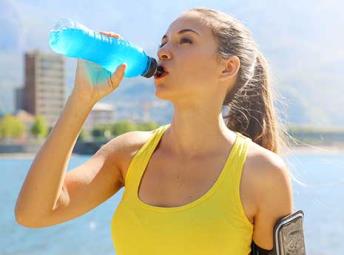No doubt you're ramping up your race-season nutrition plan to include enough carbs and healthy fats to fuel hardworking muscles, enough protein to rebuild them, and plenty of fluids to stay hydrated and energized for every run. That's good.
But what about electrolytes—those electrically-charged minerals like sodium, potassium and calcium, that keep all the systems of the body functioning like a well-oiled machine? How do you get enough of these all-important minerals to maintain your health and enhance your performance? How do you know when you're running low on electroltyes and the best way to replace them?
To find out, we talked to Katie Jeffrey, a registered dietitian, Board Certified Specialist in Sports Dietetics, and owner of FitNutrition.
"Electrolytes produce electrical impulses in the body," says Jeffrey. That makes them vitally important to a number of biochemical processes, including balanced blood chemistry, healthy blood pressure, and the proper functioning of muscles, nerves and heart.
"Runners and other endurance athletes lose electrolytes in their sweat, making it especially important that they get enough in their diet," says Jeffrey.
More: Learn the Basics of Electrolytes and Their Importance to Athletes
Muscle cramping is likely first to come to the minds of many runners worried about replenishing electrolyte levels.
Low electrolytes aren't the only cause of muscle cramps, but Jeffrey says a deficiency in certain electrolytes, combined with dehydration, is certainly one of them.
"Improper fluid intake as well as a inadequate intake of sodium, potassium and calcium can increase one's risk for cramping," says Jeffrey.
More: Hydration Tips for Better Athletic Performance
So, how do runners know when they need to replenish their electroltye levels?
According to Jeffrey, if you're a casual runner who's eating a diversity of nutrient-rich foods and staying hydrated, you probably don't need to take special steps to replace electrolytes before or after you run.
"A well-rounded nutrition plan provides most casual athletes with all the electrolytes they need," says Jeffrey.
"But if you know you sweat heavily, run in hot temperatures or heavily-layered in cold temps, or if you run longer than one hour, start consuming a sodium-enhanced sports drink or tab an hour before your run, and then every 10 to 20 minutes throughout your run, depending on how heavily you sweat."
- 1
- of
- 3







Discuss This Article